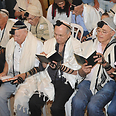
Holocaust survivors celebrate bar mitzvah
Almost 70 years after they turned 13, 10 elderly men mark event they were forced to skip under Nazi occupation. Accompanied by excited relatives, they each get called up to read from Torah at Western Wall
The 70-year delay did not get in their way as they read the Torah blessings in a trembling voice and were showered with sweets by their excited relatives, including grandchildren and great grandchildren. Not a single eye remained dry.
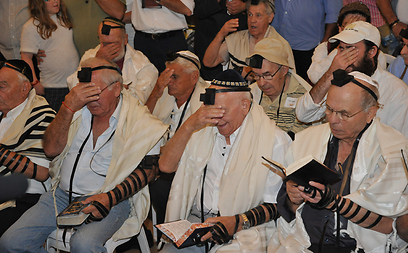
Photos: Western Wall Heritage Foundation, courtesy of Ramat Hasharon Municipality spokesman Gonen Eliasi
The 10 Holocaust survivors gathered in front of the remnant of the Temple to mark the event which they were unable to celebrate properly under Nazi occupation, almost 70 years ago.
The unique event, initiated by the Ramat Hasharon Municipality and the Western Wall Heritage Foundation, aimed to celebrate the occasion missed by 10 of the city's residents, alongside their excited family members.
'My bar mitzvah was marked by Germans'
From the moment he learned of the event, Yona Feldman has been carrying the letter from the municipality in his pocket.
"I was born on November 20, 1926, in a small town 16 kilometers (10 miles) from Auschwitz," he recounts. "The war broke out exactly two months before I turned 13, and my bar mitzvah was 'celebrated' by the Germans.
"My father and two older brothers managed to escape to Russia. They thought they were the only ones in danger and could not imagine that the Nazis would exterminate everyone.
"We were 12 Jewish children in my class, when one day the Nazis showed up at the school and took us all to a forced labor camp. We worked 14 hours a day, digging, until the first selection.
"I lied and said that I was 18. Because I looked big and was a strong guy, they believed me. My friends who did not pass the selection were sent to their death in Auschwitz. Mother arrived there too.
"Luckily, they did not have any documents revealing my young age, and so I became a forced laborer for the Germans. They enslaved us all over Germany, for just 200 grams (half a pound) of bread a day."
Did your parents manage to plan your bar mitzvah celebration before the Germans arrived?
"No one thought about me at all. The situation was very difficult. My older brothers celebrated their bar mitzvah at the magnificent synagogue in our town. They were called up to read from the Torah and there was a Kiddush for the community members.
"They were prepared for their bar mitzvah like all boys were prepared, like everyone knows. We were a traditional family, and I still define myself as traditional today."
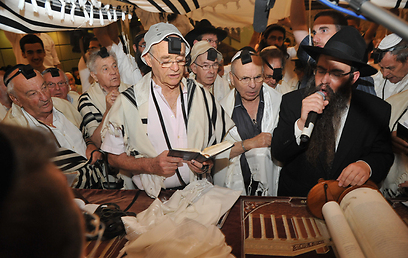
'Although 70 years late, it's still a great victory'
Participating in the event was an obvious decision for Feldman.
"I did not taste what it's like being a bar mitzvah boy. Now I have reached completion. There is a strong sense of victory, that after all the trouble we went through I am standing here, surrounded by a big splendid family, and celebrating the fact that I'm Jewish. Although 70 years late, it's still a great victory."
'Nazis killed all the rabbis'
Menashe Trifeld was born in Romania in the 1930s. As a child, he had a firsthand experience with the horrors of the Holocaust in his residential district of Bukovina.
"I was 10.5 when the Nazis first invaded the area we lived in. When I was 12.5 the Russians pulled out and the Nazis came in.
"The first thing they did was put us in a ghetto and stick a yellow patch on each one of us. The new rules included a strict prohibition on holding a quorum. Ten Jews gathered together were in danger of death. It was clear that under such circumstances, a proper bar mitzvah would be impossible."
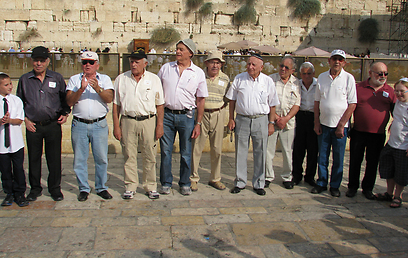
'Mostly an attempt to mark the day in that awful era'
Although Trifeld's parents were not religious Jews, they still tried to mark the special event.
"There were no rabbis, because the Nazis had already killed everyone. There was no synagogue either, because the Nazis had destroyed it. What was left was a relative who tried to teach me how to read the Haftarah (sections from the writings of the prophets) a bit.
"Mother and father marked the day itself by inviting a few relatives to our house for a modest, secret gathering. There wasn't really any food, so no refreshments were served. It was mostly just an attempt to mark the day in that awful area."
Shortly afterwards, Menashe and his family members managed to escape the transports to the death camps, and eventually arrived in Israel. He started a family, had children and grandchildren, but the memory of the bar mitzvah he missed won't let go.
"I'm not a religious person, not at all. But I wanted to experience what my grandchildren experience. It's doesn’t mean anything to me, being called up to read from the Torah or wearing phylacteries, apart from the fact that it's an interesting and unique experience that was taken away from me, and I was glad to experience it even at my advanced age, especially in light of the fact that many people my age did not live to experience it like I did."
Frustration at synagogue
This is the first time Kalman Eyal, 82, a retired electronics engineer, talks about "those four years," as he defines them.
"I haven't discussed it with my children and grandchildren, mostly because it's very difficult. How can one talk about four years of humiliation and daily suffering? It's not something I find easy to talk about, but perhaps it's time."
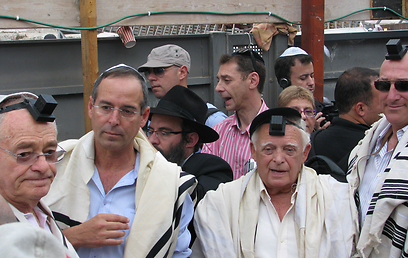
'This event evokes quite a few sentiments'
Eyal was born in the Moldova district, which had a particularly large concentration of Jews on the eve of World War II.
"The economic situation at home was very bad," he says. "The discrimination against Jews and the inability to make an honest living led father to work in a local candle factory. The money he earned was not enough to allow me to study, and I was forced to leave school and help support the family."
A year later, the area was "flooded" with German soldiers, and all Jewish children in the county were forbidden to go to school because of their religion. "Those years I was a street kid. I took odd jobs in order to earn some money for my family."
Where were you at the age of 13?
"It was the middle of the war. Mother was a religious, observant woman. Father wasn't, but he had a lot of respect for her. It was very important to her that I mark my bar mitzvah, and she found a teacher to train me a bit. But the war made it ineffective.
"I remember the day of my bar mitzvah as if it were yesterday. I went to the synagogue alone, for half an hour. The worshippers there helped me lay tefillin, and it was all done in a rush.
"I was called up to read from the Torah, and I just didn't know how. One of those present muttered sadly in Yiddish, 'He can't.' The frustration, sadness and shame I felt during those moments are something I remember to this very day. I didn't get to do it, and that’s where it ended."
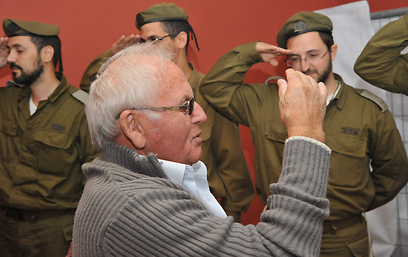
Photos: Western Wall Heritage Foundation, courtesy of Ramat Hasharon Municipality spokesman Gonen Eliasi
Eyal didn’t maintain a religious lifestyle either.
"When I immigrated to Israel I continued on a strictly secular route, and didn't have the opportunity 'to come full circle' as I do now. I feel more Israeli than Jewish. On the other hand, we're the only people in which being Israeli and Jewish is almost the same thing. In my eyes it symbolizes a sort of formal act of joining the Jewish people.
"My grandson, who will celebrate his own bar mitzvah in a few months, is here with me, and this is a very exciting moment for me. I am glad that there were people who gave us this renewed opportunity toward the end of our lives."










